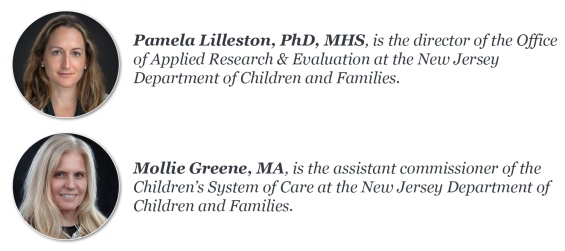In-Home Recovery Program: Keeping Families Together while Addressing Parental Substance Use Disorder
The national opioid epidemic has pushed child welfare agencies to think differently about how we support substance-using parents and their children.
Approximately 1 in 5 children under the age of 5 lives with a parent who has a substance use disorder. These children are at increased risk of experiencing child abuse or neglect and involvement with the child welfare system. In 2021, parental drug abuse was identified as a contributing factor in 36% of all placements in U.S. foster care, and in nearly half of placements among children under age 5. Yet, substance use treatment services are rarely tailored to the unique needs of parents: they seldom integrate substance use recovery with parenting and often require that treatment be completed outside of the home, creating access barriers for caregivers of young children.
Recognizing a need for change, the New Jersey Department of Children and Families initiated a pilot in 2020 of the In-Home Recovery Program, in partnership with Preferred Behavioral Health Group and with support from the Nicholson Foundation. Based in Ocean County, N.J.– a region of the state disproportionately impacted by the opioid crisis—the In-Home Recovery Program is unique. It offers an alternative to parent-child separation for families in crisis due to substance use. At the program’s core is a recognition that parenting and recovery are inter-connected: recovery can improve a parent’s ability to provide competent care for their child while a parent’s attachment to their child reinforces abstinence.
The In-Home Recovery Program provides integrated, concurrent treatment of substance use and parenting challenges for parents and young children involved with New Jersey’s child protective services in their own homes. Through implementation of the evidence-informed Family-Based Recovery model, developed by Connecticut Department of Children and Families, the Yale University Child Study Center, and Johns Hopkins University, the program seeks to support substance use recovery, build healthy parent-child attachment, encourage positive child development and ensure family stability. Parents who participate in the program receive a combination of substance use treatment, psychotherapy and parent-child therapy sessions focused on understanding their child’s unique developmental needs. They also have the opportunity to attend group sessions and receive support accessing additional services, as needed, such as Early Intervention.
To date, 68 families have been served by the In-Home Recovery Program, with promising results. Findings from Rutgers University School of Social Work’s evaluation of the program indicate that parents’ substance use substantially decreased during their participation in the program. Additionally, parents who participated in the program were less likely than similar child welfare-involved families in New Jersey and nationally to be re-reported to the child welfare system, abuse or neglect their child or have their child placed in foster care.
And parents feel the difference. In qualitative interviews, parents describe the program as unlike treatment they have received in the past. In-Home Recovery’s comprehensive, trauma-informed approach feels responsive to their unique needs as a parent on the path to substance use recovery.
This pilot has shown that, with the right services in place, parents can and do successfully achieve substance use recovery while actively parenting young children. We plan to expand the model in the upcoming year to additional counties in New Jersey, and we are hopeful that the program will serve as a model for other child welfare jurisdictions.

